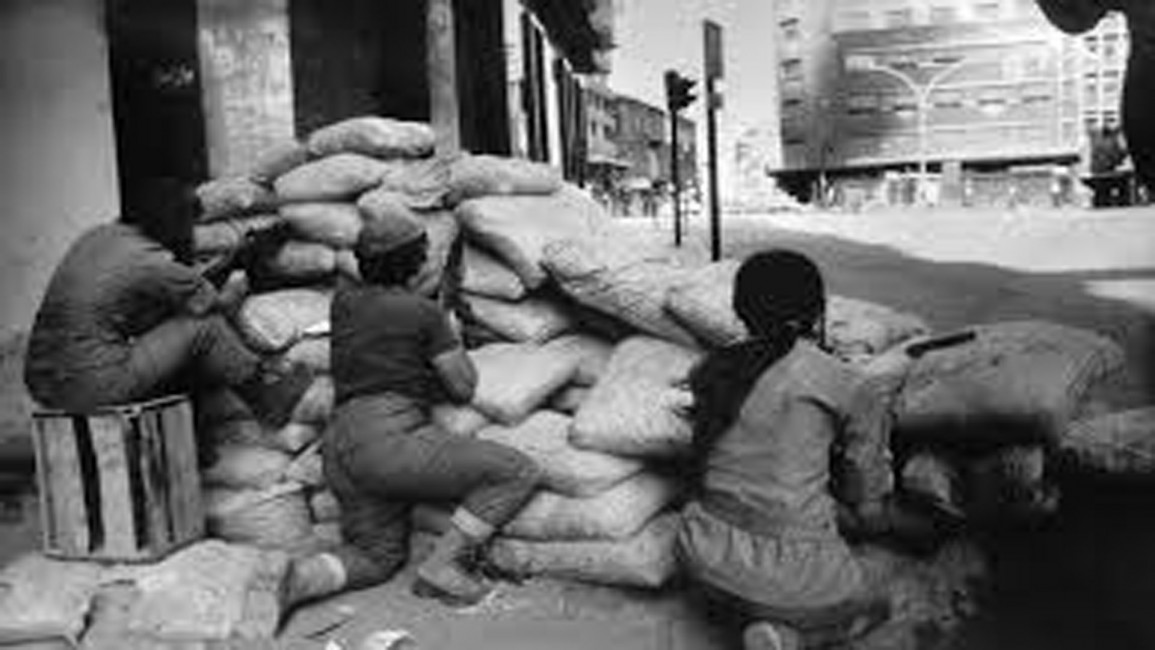
I survived two civil wars in Lebanon
I lived through two civil wars in Lebanon and escaped death, but did not escape damage to my soul. I was seven years old in 1958 and we did not have a television at home, so we only witnessed the war as it entered our homes and lives.
In the Palestinian refugee camp where I lived, the war manifested itself through the many pictures of Gamal Abdel Nasser and the Lebanese politician Maarouf Saad that were plastered on the walls in the camp. We heard about the war through the nighttime conversations of the adults who cursed Camille Chamoun, Lebanon's president at the time, the Baghdad Pact and the US with its Sixth Fleet, which was in the port of Beirut, while they emotionally praised Arab nationalism and its hero in Cairo.
I used to feel safe when I saw the pictures of Abdel Nasser in our house and the houses of other refugees in the camp, as if that picture would be able to protect me against my fragility and my enemies. I would not imagine our enemies, as I did not know our enemies at the point, except for the pictures of Camille Chamoun surrounded by some Lebanese soldiers who guarded him. Later I saw pictures of US Marines, with their strange haircuts, white skin and blond hair.
| I used to feel safe when I saw the pictures of Gamal Abdel Nasser in our house as if that picture would be able to protect me from my enemies. |
I later wondered how a seven year old could have all this number of powerful enemies. As the war developed I acquired a new enemy, the Syrian Social Nationalist Party. That is what we were made to understand, as the party had politically and militarily supported Camille Chamoun resulting in the party being ostracised by Arab nationalists and Nasserites, especially in the refugee camp. Therefore, the party's leadership deciding to move its Palestinian members from the refugee camp to its headquarters in Dik el-Mehdi in Mount Lebanon.
The Syrian Social Nationalist Party send a Lebanese army force to carry out the task, however the force was confronted by popular resistance, which put up a fierce fight that resulted in the death of three Palestinian Syrian Social Nationalist Party members. The army force left the camp after having failed in its mission. I still remember that day because the Nasserite Popular Resistance did not allow the families of the three dead party members, Saleh al-Khatib, Falah Shabaytah and Ahmed al-Shayeb, to bury them in the Muslim graveyards in Sidon, where Palestinians usually buried their dead. This forced their families to bury them in their gardens.
Ahmed al-Shayeb's house was 150 meters away from our house in the refugee camp, and seeing a grave in his house garden was my first experience of death and the strange fates that awaited Palestinians, after they had lost a place to live and the right to be buried in, after they had lost their country a decade ago. That experience was also the first sign of the cruelty and misery that would be repeated 15 years later in a more brutal war in 1975. Fortunately for me, I was in love with a Lebanese Christian woman when the war broke out.
We were similar in age, thought and dreams, while the war was brutal and crowded with various players and identities that could get you killed at any checkpoint and in every area. Our sight together at the fruit vendor was normal to the area's residents, from normal citizens to resisters and security forces from various factions. We would travel together between Tripoli and Beirut on the long roads to avoid the checkpoints where you would be killed for your identity. Fortunately, I made Christian Lebanese friends, who I love and who loved me back, who I defended and did all that I could to protect in those vicious moments of the war. They also defended me through the light in their hearts and the purity of their souls, which infected mine.
It was not politics or ideology that saved my live during the war, but perhaps love. I did not come out of the war without wounds. In the second year of the war, the Syrian Army became directly involved in the war after its intelligence services covertly played a primary role in a number of sectarian massacres against Christian villages and for which it accused Palestinian and Lebanese groups. I lost my young brother to the bullets of the Syrian Army, as well as many friends and dear ones. I escaped death but my soul still bleeds.
Opinions expressed in this article remain those of the author and do not necessarily reflect the opinions of al-Araby al-Jadeed, its editorial board or staff.
This is an edited translation from our Arabic edition.




